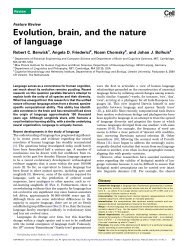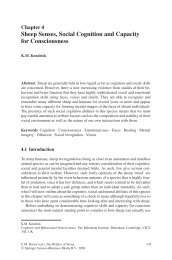Ulric Neisser
Ulric Neisser
Ulric Neisser
You also want an ePaper? Increase the reach of your titles
YUMPU automatically turns print PDFs into web optimized ePapers that Google loves.
program served as R.A.s and T.A.s, took the same seminars as Swarthmore honors students, and<br />
completed an thesis in their second year. It sounded great: I applied and was accepted for the fall<br />
of 1950.<br />
My two years at Swarthmore were happy and valuable, but not at all what I had expected.<br />
Except for one seminar I had little contact with Köhler, who was then wrapping up his studies of<br />
direct currents in the visual cortex. My real teachers were Hans Wallach and Henry Gleitman,<br />
from whom I learned two very different ways of doing psychology. As Wallach's RA, my first<br />
task was to run subjects in a study that followed up on his recent demonstration of the kinetic<br />
depth effect (Wallach et al, 1953). The ingenuity of that demonstration made a deep impression<br />
on me: since then I have always been partial to clever experiments that address important<br />
questions, even if they don't have much by way of theoretical basis.<br />
In contrast with the solitary conduct of Wallach's perception experiments, learning with<br />
Henry Gleitman was an essentially social experience. My fellow graduate student Jacob (Jack)<br />
Nachmias and I spent many hours with Gleitman, an assistant professor who had just received<br />
his Ph.D. from E. C. Tolman at Berkeley. We talked psychology, graded papers, made jokes,<br />
became friends. Our chief theoretical concern was the life-and-death struggle between the<br />
mechanistic behaviorists - led by Clark Hull and Donald Spence - and the Gestalt-oriented<br />
"expectancy" theorists led by Tolman. We had a great time finding flaws in Hull's theory of<br />
extinction, and eventually submitted a critique of that theory to Psychological Review. Our paper<br />
(Gleitman et al, 1954) was accepted and we were proud of it, though I have never heard that<br />
anyone actually abandoned Hull's theory because of our arguments.<br />
My second year was even more eventful. Gleitman and Nachmias and I shared an<br />
apartment, and I developed a social life with the Swarthmore co-eds. Occasionally one of them<br />
would keep me company while I ran rats in my M.A. experiment, a study designed to refute<br />
Spence's theory of transposition. (The rats were uncooperative and sometimes bit; I've never run<br />
another animal experiment.) Soon I hooked up with Anna Peirce, an attractive freshman with a<br />
family in Maine. It gradually became clear that she and I would stay together, even in the next<br />
year when I would be attending a different graduate school. But where would that be, and with<br />
what emphasis? Behaviorism was out, and Gestalt psychology no longer seemed a viable<br />
alternative. The hot new idea was information theory, which I had already heard about from<br />
George Miller. Miller himself had just moved to a new psychology department being established<br />
at M.I.T., so I decided to go there too.<br />
Two more graduate schools<br />
Everyone at M.I.T. was friendly, but I wasn't happy there. None of the ongoing research<br />
attracted me, and no one shared my interest in the struggle against behaviorism. I did manage<br />
one anti-behaviorist experiment ("An experimental distinction between perceptual process and<br />
verbal response," 1954), but it didn't lead anywhere. Anna and I were married (by the Cambridge<br />
town clerk) and set up housekeeping, but she wasn't making any progress toward completing her<br />
education. As the academic year drew to a close, an attractive possibility that addressed all these<br />
difficulties suddenly appeared: Swarthmore offered me an appointment as an instructor! So we<br />
spent 1953-54 there: I taught various courses, Anna completed her sophomore year, and in April<br />
our first child Mark was born.<br />
In the summer of 1954 we moved back to Cambridge so I could resume my studies at<br />
M.I.T., but I was actually reluctant to do so. There was an alternative: Harvard was not far away,<br />
and the Psychology Department might still remember me. It seems that they did; in any case,<br />
6




